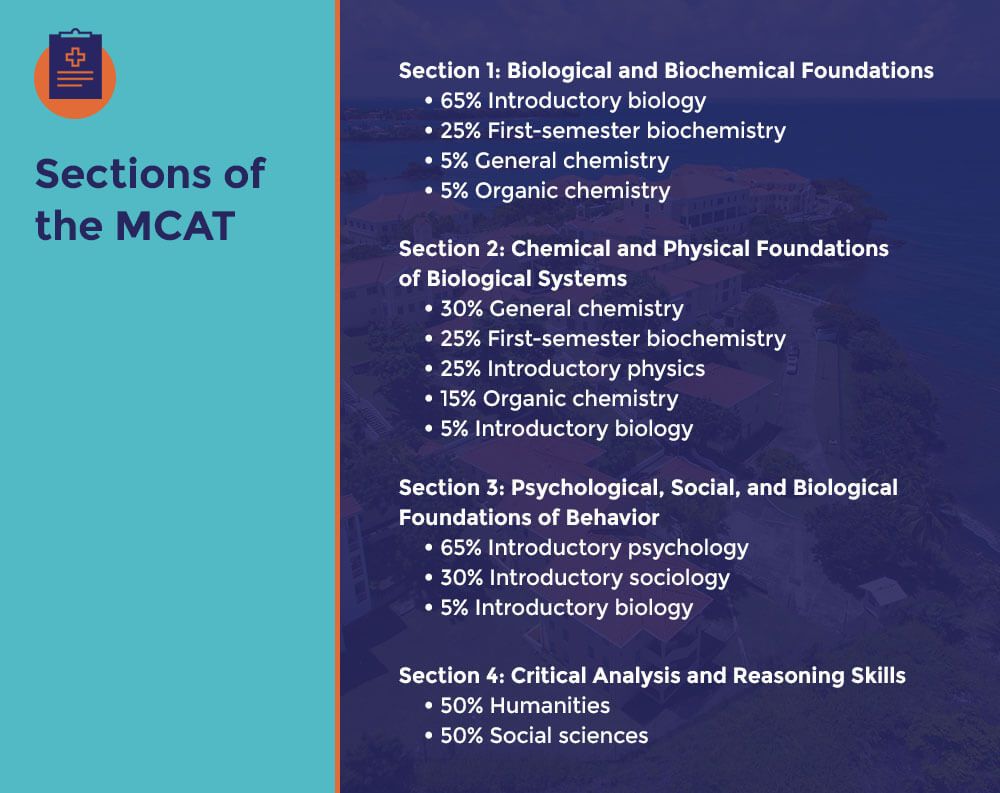As a pre-med student, you know the Medical College Admission Test (MCAT) is in your future. This standardized, multiple-choice exam is administered by the Association of American Medical Colleges (AAMC), and it’s a requirement for all aspiring doctors preparing to apply to medical school.
Each year, more than 85,000 medical school hopefuls sit for the exam, so it’s important to prepare extensively and secure a good MCAT score. The most effective study plan includes closely reviewing the content that will be on the test.
To gain a better understanding of what to expect, read on for a detailed breakdown of the MCAT sections.
What’s on the MCAT? A section-by-section preview
The MCAT is presented in a computer-based format, with 230 questions divided into four sections:
- Biological and Biochemical Foundations of Living Systems
- Chemical and Physical Foundations of Biological Systems
- Psychological, Social, and Biological Foundations of Behavior
- Critical Analysis and Reasoning Skills
The first three sections are organized around foundational concepts in the sciences, while the final section focuses on an examinee’s comprehension abilities as they relate to the humanities and social sciences.
Throughout the four sections of the MCAT, examinees are evaluated based on four foundational scientific inquiry and reasoning skills:
- Knowledge of scientific concepts and principles
- Scientific reasoning and problem-solving
- Reasoning about the design and execution of research
- Data-based and statistical reasoning

Section 1: Biological and biochemical foundations
Objective: Tasks examinees with solving problems by combining their knowledge of biological and biochemical concepts with their scientific inquiry and reasoning skills.
Number of questions: 59
Time allotted: 95 minutes
This section tests for the following:
- Introductory-level biology, organic chemistry, and inorganic chemistry concepts
- Biochemistry concepts equivalent to those taught in undergraduate, first-semester biochemistry courses
- Cellular and molecular biology concepts equivalent to those taught in introductory biology sequences and undergraduate, first-semester biochemistry courses
This section includes the following content breakdown:
- 65% introductory biology
- 25% first-semester biochemistry
- 5% general chemistry
- 5% organic chemistry
Section 2: Chemical and physical foundations of biological systems
Objective: Tasks examinees with solving problems by combining their knowledge of chemical and physical foundational concepts with their scientific inquiry and reasoning skills.
Number of questions: 59
Time allotted: 95 minutes
This section tests for the following:
- Introductory-level biology, organic and inorganic chemistry, and physics concepts
- Biochemistry concepts equivalent to those taught in undergraduate, first-semester biochemistry courses
- Molecular biology topics equivalent to introductory biology sequences and undergraduate, first-semester biochemistry courses
This section includes the following content breakdown:
- 30% general chemistry
- 25% first-semester biochemistry
- 25% introductory physics
- 15% organic chemistry
- 5% introductory biology
Section 3: Psychological, social, and biological foundations of behavior
Objective: Tasks examinees with solving problems by combining their knowledge of foundational concepts with their scientific inquiry and reasoning skills.
Number of questions: 59
Time allotted: 95 minutes
This section tests for the following:
- Psychology, sociology, and biology concepts that provide a solid foundation for learning in medical school about the behavioral and sociocultural determinants of health
- Concepts equivalent to those taught in undergraduate, first-semester psychology and sociology courses
- Biology concepts related to mental processes and behavior equivalent to those taught in undergraduate introductory biology courses
This section includes the following content breakdown:
- 65% introductory psychology
- 30% introductory sociology
- 5% introductory biology
Section 4: Critical analysis and reasoning skills
Objective: Tasks examinees with answering questions based on various passages of writing, specifically looking to measure the analysis and reasoning skills a candidate will need to be successful in medical school.
Each passage is between 500 and 600 words, and they contain complex, often thought-provoking writing with sophisticated vocabulary and intricate writing styles. The questions asked require examinees to assess the content while also considering the author’s intentions and tones, as well as the words they used to express their points of view.
Number of questions: 53
Time allotted: 90 minutes
This section tests for the following:
- An examinee’s analysis and reasoning skills, including foundations of comprehension, reasoning within the text, and reasoning beyond the text
- Concepts related to ethics, philosophy, studies of diverse cultures, population health, and a wide range of social sciences and humanities disciplines
This section includes the following content breakdown:
- 50% humanities
- 50% social sciences
Prepare for the MCAT with intention
The MCAT is arguably one of the most important requirements for admission into a quality Doctor of Medicine (MD) program. It’s critical to invest the necessary time to prepare for this exam—and now that you know what will be included in each of the MCAT sections, you’re better equipped to craft an effective study plan.
For more advice on preparing for the MCAT, visit our article “How to Study for the MCAT: 6 Tips and Tricks to Try.”


